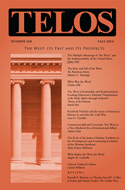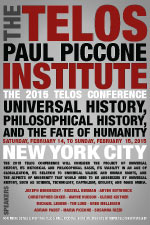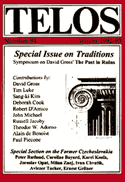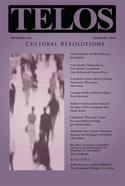By Luca G. Castellin · Thursday, October 23, 2014  At the beginning of the 1950s, Reinhold Niebuhr used the Christian concept of “irony” to explain the difficult condition of the United States in the international system. In The Irony of American History the protestant theologian analyzed the ambiguity of American foreign policy during the first years of the Cold War. According to Niebuhr, the United States was involved in an ironic confutation of its sense of virtue, strength, security, and wisdom. This confutation was due not only to its lack of (Christian) realism but also to its false claim to dominate history. After the fall of the Berlin Wall, when America became the most powerful nation of the international system, the irony of its history did not disappear. Even in a totally different situation for structure and distribution of power, compared to the one of sixty years ago, the ambiguous situation of the United States can be spelled out through irony again. This article discusses the lasting validity of the concept of “irony” used to explain the American present and, perhaps, its future. At the beginning of the 1950s, Reinhold Niebuhr used the Christian concept of “irony” to explain the difficult condition of the United States in the international system. In The Irony of American History the protestant theologian analyzed the ambiguity of American foreign policy during the first years of the Cold War. According to Niebuhr, the United States was involved in an ironic confutation of its sense of virtue, strength, security, and wisdom. This confutation was due not only to its lack of (Christian) realism but also to its false claim to dominate history. After the fall of the Berlin Wall, when America became the most powerful nation of the international system, the irony of its history did not disappear. Even in a totally different situation for structure and distribution of power, compared to the one of sixty years ago, the ambiguous situation of the United States can be spelled out through irony again. This article discusses the lasting validity of the concept of “irony” used to explain the American present and, perhaps, its future.
Continue reading →
By Telos Press · Friday, October 17, 2014  One last reminder that Monday is the deadline for submitting your abstract for next year’s Telos Conference in New York. The conference, which will take place on February 14-15, 2015, will focus on the theme of “Universal History, Philosophical History, and the Fate of Humanity.” For the full call for papers and other details, please visit the conference page at the Telos-Paul Piccone Institute website. If you wish to present a paper, send in your abstract (no more than 250 words) and a short c.v. to telosnyc@telosinstitute.net and place “The 2015 Telos Conference” in the email’s subject line. One last reminder that Monday is the deadline for submitting your abstract for next year’s Telos Conference in New York. The conference, which will take place on February 14-15, 2015, will focus on the theme of “Universal History, Philosophical History, and the Fate of Humanity.” For the full call for papers and other details, please visit the conference page at the Telos-Paul Piccone Institute website. If you wish to present a paper, send in your abstract (no more than 250 words) and a short c.v. to telosnyc@telosinstitute.net and place “The 2015 Telos Conference” in the email’s subject line.
Continue reading →
By Telos Press · Wednesday, September 24, 2014 On February 14–15, 2015, the Telos-Paul Piccone Institute will hold its annual conference in New York City. The theme of the conference will be “Universal History, Philosophical History, and the Fate of Humanity.” The deadline for abstract submissions has been extended until October 20, so if you missed last week’s deadline but still wish to present a paper, send your abstract (no more than 250 words) and a short c.v. to telosnyc@telosinstitute.net and place “The 2015 Telos Conference” in the email’s subject line. For the full call for papers and other details about the conference, please visit the conference page at the Telos-Paul Piccone Institute website.
Continue reading →
By Aaron Bell · Tuesday, May 20, 2014  It is hard to imagine what Adorno’s corpus would look like without the deep scars left by his period of exile in the United States during the Second World War. Despite its catastrophic genesis, his exile played a constitutive role in the development of his thought, and made him, among many other things, a savagely insightful commentator on American life. This commentary on America is marked by a dialectic of fascination and disgust with his newfound home, perhaps the most “radically bourgeois country” (75) in the Western world. In particular, he was fascinated by America’s lack of cultural tradition. In his essay “On Tradition,” America serves as a model of a society ravaged by bourgeois rationalization, proudly celebrating its lack of tradition by rejecting “old world” values as archaic, irrational, and pompous. The relatively short history of the nation compounds the problem, further disconnecting us from any substantial sense of tradition or historical consciousness. We are proudly the country of the nouveau riche, possessed of power and wealth bereft of tradition and culture. This literal lack of history and evaluative rejection of tradition places America at ground zero of the crisis of tradition. Tradition survives in America in its most degraded and mutilated forms, manufactured in artificially aged consumer products and conservative “traditional” family values. The recent wave of gauche typographical décor emblazoned with the actual word “TRADITION” seems designed to confirm Adorno’s worst accusations. It is hard to imagine what Adorno’s corpus would look like without the deep scars left by his period of exile in the United States during the Second World War. Despite its catastrophic genesis, his exile played a constitutive role in the development of his thought, and made him, among many other things, a savagely insightful commentator on American life. This commentary on America is marked by a dialectic of fascination and disgust with his newfound home, perhaps the most “radically bourgeois country” (75) in the Western world. In particular, he was fascinated by America’s lack of cultural tradition. In his essay “On Tradition,” America serves as a model of a society ravaged by bourgeois rationalization, proudly celebrating its lack of tradition by rejecting “old world” values as archaic, irrational, and pompous. The relatively short history of the nation compounds the problem, further disconnecting us from any substantial sense of tradition or historical consciousness. We are proudly the country of the nouveau riche, possessed of power and wealth bereft of tradition and culture. This literal lack of history and evaluative rejection of tradition places America at ground zero of the crisis of tradition. Tradition survives in America in its most degraded and mutilated forms, manufactured in artificially aged consumer products and conservative “traditional” family values. The recent wave of gauche typographical décor emblazoned with the actual word “TRADITION” seems designed to confirm Adorno’s worst accusations.
Continue reading →
By Telos Press · Wednesday, April 2, 2014 At this year’s Telos Conference in New York City, Telos Associate Editor Adrian Pabst outlined the theme of the upcoming Telos in Europe Conference, which will be held on September 5–8, in L’Aquila, Italy. This conference will focus on “The Idea of Europe,” and will offer speakers and attendees an opportunity to discuss Europe’s current crisis of identity. For complete details about the conference, as well as the full call for papers, please visit the conference page on the Telos Paul Piccone Institute website, located here.
Continue reading →
By Greg Melleuish and Susanna Rizzo · Friday, September 13, 2013 Greg Melleuish and Susanna Rizzo’s “From Secular Temporality to Post-Secular Timelessness: Trekking the Past’s Future and Future’s Past” appears in Telos 163 (Summer 2013). Read the full version online at the Telos Online website, or purchase a print copy of the issue in our store.
 This essay is built on the assumption that History is as much about the future as it is about the past and that there is a “politics of history” that determines the relationship of the past to the present and the future. The secularization thesis created a model of history in which human beings passed from a condition in which they were religious, primitive, and querulous to one in which they were moving toward a world that would be not only secular but also peaceful. At the same time, the end of History can be understood in eschatological terms in which we are always at the end of days waiting for the purging that will allow the purpose of History to be fulfilled. The return of religion destroys this narrative and allows others to return, including History as irony and the possibility of the story as a denial of History. Post-secular History reflects both the crumbling of this once certain narrative and the legitimacy of the modern state that was built on that narrative. It is a crisis of authority, as can be seen in the proliferation of views and ideas that can be found on the world wide web, and the seeming erosion of the capacity of historians to control History and structure its narratives. This essay is built on the assumption that History is as much about the future as it is about the past and that there is a “politics of history” that determines the relationship of the past to the present and the future. The secularization thesis created a model of history in which human beings passed from a condition in which they were religious, primitive, and querulous to one in which they were moving toward a world that would be not only secular but also peaceful. At the same time, the end of History can be understood in eschatological terms in which we are always at the end of days waiting for the purging that will allow the purpose of History to be fulfilled. The return of religion destroys this narrative and allows others to return, including History as irony and the possibility of the story as a denial of History. Post-secular History reflects both the crumbling of this once certain narrative and the legitimacy of the modern state that was built on that narrative. It is a crisis of authority, as can be seen in the proliferation of views and ideas that can be found on the world wide web, and the seeming erosion of the capacity of historians to control History and structure its narratives.
Continue reading →
|
|
 At the beginning of the 1950s, Reinhold Niebuhr used the Christian concept of “irony” to explain the difficult condition of the United States in the international system. In The Irony of American History the protestant theologian analyzed the ambiguity of American foreign policy during the first years of the Cold War. According to Niebuhr, the United States was involved in an ironic confutation of its sense of virtue, strength, security, and wisdom. This confutation was due not only to its lack of (Christian) realism but also to its false claim to dominate history. After the fall of the Berlin Wall, when America became the most powerful nation of the international system, the irony of its history did not disappear. Even in a totally different situation for structure and distribution of power, compared to the one of sixty years ago, the ambiguous situation of the United States can be spelled out through irony again. This article discusses the lasting validity of the concept of “irony” used to explain the American present and, perhaps, its future.
At the beginning of the 1950s, Reinhold Niebuhr used the Christian concept of “irony” to explain the difficult condition of the United States in the international system. In The Irony of American History the protestant theologian analyzed the ambiguity of American foreign policy during the first years of the Cold War. According to Niebuhr, the United States was involved in an ironic confutation of its sense of virtue, strength, security, and wisdom. This confutation was due not only to its lack of (Christian) realism but also to its false claim to dominate history. After the fall of the Berlin Wall, when America became the most powerful nation of the international system, the irony of its history did not disappear. Even in a totally different situation for structure and distribution of power, compared to the one of sixty years ago, the ambiguous situation of the United States can be spelled out through irony again. This article discusses the lasting validity of the concept of “irony” used to explain the American present and, perhaps, its future. 
 It is hard to imagine what Adorno’s corpus would look like without the deep scars left by his period of exile in the United States during the Second World War. Despite its catastrophic genesis, his exile played a constitutive role in the development of his thought, and made him, among many other things, a savagely insightful commentator on American life. This commentary on America is marked by a dialectic of fascination and disgust with his newfound home, perhaps the most “radically bourgeois country” (75) in the Western world. In particular, he was fascinated by America’s lack of cultural tradition. In his essay “On Tradition,” America serves as a model of a society ravaged by bourgeois rationalization, proudly celebrating its lack of tradition by rejecting “old world” values as archaic, irrational, and pompous. The relatively short history of the nation compounds the problem, further disconnecting us from any substantial sense of tradition or historical consciousness. We are proudly the country of the nouveau riche, possessed of power and wealth bereft of tradition and culture. This literal lack of history and evaluative rejection of tradition places America at ground zero of the crisis of tradition. Tradition survives in America in its most degraded and mutilated forms, manufactured in artificially aged consumer products and conservative “traditional” family values. The recent wave of gauche typographical décor emblazoned with the actual word “TRADITION” seems designed to confirm Adorno’s worst accusations.
It is hard to imagine what Adorno’s corpus would look like without the deep scars left by his period of exile in the United States during the Second World War. Despite its catastrophic genesis, his exile played a constitutive role in the development of his thought, and made him, among many other things, a savagely insightful commentator on American life. This commentary on America is marked by a dialectic of fascination and disgust with his newfound home, perhaps the most “radically bourgeois country” (75) in the Western world. In particular, he was fascinated by America’s lack of cultural tradition. In his essay “On Tradition,” America serves as a model of a society ravaged by bourgeois rationalization, proudly celebrating its lack of tradition by rejecting “old world” values as archaic, irrational, and pompous. The relatively short history of the nation compounds the problem, further disconnecting us from any substantial sense of tradition or historical consciousness. We are proudly the country of the nouveau riche, possessed of power and wealth bereft of tradition and culture. This literal lack of history and evaluative rejection of tradition places America at ground zero of the crisis of tradition. Tradition survives in America in its most degraded and mutilated forms, manufactured in artificially aged consumer products and conservative “traditional” family values. The recent wave of gauche typographical décor emblazoned with the actual word “TRADITION” seems designed to confirm Adorno’s worst accusations.  This essay is built on the assumption that History is as much about the future as it is about the past and that there is a “politics of history” that determines the relationship of the past to the present and the future. The secularization thesis created a model of history in which human beings passed from a condition in which they were religious, primitive, and querulous to one in which they were moving toward a world that would be not only secular but also peaceful. At the same time, the end of History can be understood in eschatological terms in which we are always at the end of days waiting for the purging that will allow the purpose of History to be fulfilled. The return of religion destroys this narrative and allows others to return, including History as irony and the possibility of the story as a denial of History. Post-secular History reflects both the crumbling of this once certain narrative and the legitimacy of the modern state that was built on that narrative. It is a crisis of authority, as can be seen in the proliferation of views and ideas that can be found on the world wide web, and the seeming erosion of the capacity of historians to control History and structure its narratives.
This essay is built on the assumption that History is as much about the future as it is about the past and that there is a “politics of history” that determines the relationship of the past to the present and the future. The secularization thesis created a model of history in which human beings passed from a condition in which they were religious, primitive, and querulous to one in which they were moving toward a world that would be not only secular but also peaceful. At the same time, the end of History can be understood in eschatological terms in which we are always at the end of days waiting for the purging that will allow the purpose of History to be fulfilled. The return of religion destroys this narrative and allows others to return, including History as irony and the possibility of the story as a denial of History. Post-secular History reflects both the crumbling of this once certain narrative and the legitimacy of the modern state that was built on that narrative. It is a crisis of authority, as can be seen in the proliferation of views and ideas that can be found on the world wide web, and the seeming erosion of the capacity of historians to control History and structure its narratives. 

